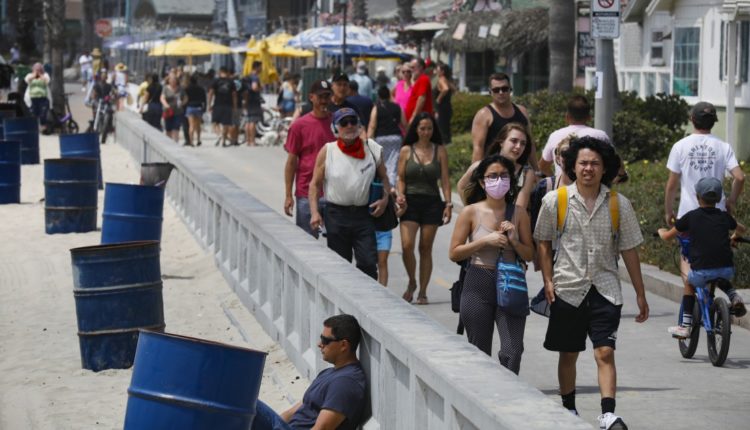Number of Delta variants in San Diego County more than doubles in a week – The San Diego Union-Tribune
After weeks of relative stability, the number of coronavirus cases, Delta variants and hospitalizations tracked slightly upward in this week’s report from the county health department.
To be sure, the trend visible in the region’s COVID-19 update is nothing remotely close to the spike that filled local hospitals this past winter.
But experts are expressing concern that those who are not yet vaccinated or who are only partially vaccinated are vulnerable just as the Delta variant gains dominance in San Diego County, which has seen a slower path due to better-than-average overall vaccination rates.
The county’s count of local delta cases more than doubled in a week, increasing from 25 to 54 in the latest summary, and the overall number of new positive coronavirus test results received by the county epidemiology department was over 100 per day for six of the seven days from June 30 through July 6.
While the total number of delta cases still looks quite small, especially against the 794 total new cases detected countywide during that span, Dr. Seema Shah, medical director of epidemiology and immunization services for San Diego County, said that’s not quite the right way to think about variants.
For one thing, it’s impossible to identify which variant is involved from a positive test alone. Genetic sequencing is required to determine which variant caused any given positive test result, and there is a two- to three-week lag time between when samples are collected and when the results arrive at local health departments for reporting to the public.
So, fresh variant reports are a window of insight into what was going on in the recent past rather than a signal of the current ground truth in neighborhoods from Oceanside to San Ysidro.
A decentralized genetic testing effort also means that many positive tests are never sequenced, meaning that one variant actually detected likely represents many that never made it that far in the identification process.
“In terms of the new cases that have been reported in the last two or three weeks, it’s difficult to know what percentage of that is delta because of the delay in receiving sequencing results,” Shah said.
But nobody, she added, should care too much about the specific numbers or even which variant is involved.
It’s enough to see that both overall case totals and variant reports are trending upwards, and much more quickly for those who are not vaccinated. A new report published by the county this week indicates that 99.1 percent of COVID-19 cases since Jan. 1 have been among unvaccinated residents, and the case rate among the unvaccinated is over 4 per 100,000 residents compared to less than 1 per 100,000 for the 1.89 million in San Diego County who are fully vaccinated.
“For me, it’s less about the specific variant and more about the continued vaccination of individuals,” Shah said.
The region’s vaccination dashboard also got its weekly update Wednesday evening, pushing past 2.2 million local residents who have received at least one dose. However, there are more than 2.8 million people living in San Diego County who are age 12 or older, meeting federal guidelines for coronavirus inoculation.
That means there are nearly 600,000 people across the region who could get vaccinated but so far have not.
Dr. Robert Schooley, an infectious disease expert at UC San Diego, said in an email Thursday that those folks should not kid themselves about the risks they are taking. The Delta variant, first detected in India, has shown itself to be more resistant to the natural antibodies generated from previous infections, more transmissible than other types and more likely to cause hospitalization.
“As more and more people are out and about without masks and as the Delta variant moves into San Diego, we’re likely going to see more hospitalizations, especially among the unvaccinated,” Schooley said. “Those who continue to procrastinate about getting vaccinated do so at their own peril.”


Comments are closed.